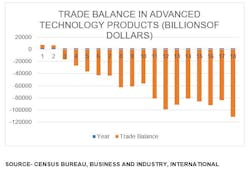America has been the source of new inventions for the world for most of the 20th century. The following is just a partial list, with the year they were patented:
- Microwave Oven 1945, Transistor 1947, Compiler 1949
- Bar Code 1952, Hard Disk Drive 1955, Industrial Robot 1956, Videotape 1956, Integrated Circuit 1958
- Electric Spreadsheet 1961, Plasma Display 1964, Compact Disc 1965, Hand Calculator 1967, Laser Printer 1969, Charge Coupled Device 1969
- Microprocessor 1971, Resonance Imaging (MRI) 1972, Digital Camera 1975, Gore-Tex 1976
And the list goes on: lithium batteries, mobile phones, solar cells, desktop PCs, laptops, servers, routers, advances ceramics, LCDs etc.
The Problem
What is really unusual about these American inventions is that most are no longer manufactured in America. American companies did the research and development of the original products, but then manufactured the products in countries with the lowest labor costs,
The same process goes on today, but we are now not only losing the technologies; we are losing whole industries.This scenario begs the obvious question: How many technologies and industries can we lose before we also lose our ability to compete using innovation as our primary strategy?
We must face the fact that foreign countries are reaping the rewards from technologies pioneered in the U.S.
The Special Case of Advanced Technology Products
China has already swallowed the low-tech products we used to make. What they want now are our advanced technology products and all of the new technologies that are developed in the U.S.
The U.S. government has a designation for a certain collection of industries that are at the forefront of economic growth: the Advanced Technology Industries. The sector includes 50 industries, including 35 in manufacturing. They range from oil and gas to aerospace, biotechnology, life sciences, opto-electronics, communication, weapons, computer systems and software. The designation also includes most emerging technology industries such as, nanotech, optics, additive manufacturing, advanced materials, advanced robotics, big data analytics, cloud computing, the Internet of Things, self-driving cars and genomics.
Advanced Technology Industries are absolutely vital to the American Economy and are our best shot at maintaining competitive advantage and sustainable economic growth. But as important as the Advanced Technology Industries are, there are big problems emerging. The following charts shows that in 2000, we had a trade surplus in these industries of $5 billion. By 2018, the surplus has turned into a deficit of $110 billion.
These industries are America’s best (and maybe only) answer to creating an innovation strategy that makes us competitive in the future. America must do whatever it takes to protect our advanced technology industries and to eliminate continuing trade deficits. Once manufacturing leaves, engineering and production know-how also leave, and skills, suppliers and innovation activities eventually follow.
How Did We Get into this Jam?
In 2001, China was allowed into the World Trade Organization (WTO). The politicians at that time were very supportive of this. One of the leading proponents was President Bill Clinton, who said that WTO membership would “wean China off state-owned enterprises and open its society.”
Both Clinton and the presidents who followed were very naïve about China’s intentions. Our approach has been one of appeasement, of hoping that China would give up its mercantilist strategies and somehow see the wisdom of fair trade. Up until President Donald Trump, our government has been afraid to confront China and or enforce the rules of our agreements. One administration after another capitulated.
As a result, China views the United States as a paper tiger who whines about cheating but does nothing about it. China has been very successful at bullying us and ignoring our demands for fair trade, and will continue to cheat and play their own game as long as the U.S. does not fight back.
A recent New York Times editorial said, “China is heading in the opposite direction under the strong man rule of Xi Jinping, toward less political freedom and more state control of the economy. Far from modeling itself on the United States, China is presenting itself as a defiant alternative.”
After 17 years of competing against China, America is waking up to the fact that we are in a trade war with China, and are losing badly.
China’s Plan for the Future
Released in 2015, Made in China 2025 is the government’s 10-year plan to update China’s manufacturing base by either developing or acquiring innovative technologies in 10 key areas. Chief among these are electric cars and other new-energy vehicles; next-generation information technology (IT); telecommunications; advanced robotics and artificial intelligence.
If China can acquire technological know-how without having to invest in R&D, all the better. According to the Economic Policy Institute, “China blocks imports, pirates software and technology from foreign producers, manipulates its currency, invests in massive amounts of excess production capacity in a range of basic industries, often through state owned enterprises (SOEs).”
American multinational companies are also complicit in losing our technology. They want access to the huge Chinese markets but have to cede their intellectual property to get it. They give away their technology when they sign joint venture and tech transfer agreements, or simply expose technology secrets by manufacturing the products in a foreign country.
They have taken a short-term-profit approach and ignored the long-term consequences, including the consequence that they are creating new competition for themselves by giving away their R&D.
America’s only chance to keep its position as the No. 1 economy is through innovation based on the continuous development of new products and technologies, and through policies that protect those technologies.
1. The U.S. government should set a deadline for reducing the trade deficit. This would have to be a political, not a business, decision because America’s multinational corporations who have built plants in Asia are benefiting from the trade deficit, along with big importers of Chinese goods like Walmart and Apple.
2. Congress should find ways to fund start-up companies that are ready to scale up production. Startups that run out of venture funds in the U.S. look for foreign partners that will help them scale up production. These partners can then expropriate the startups’ technology. Government loans rather than foreign investment keep the technology in the United States.
3. Congress and the President should work harder to enhance enforcement of fair-trade laws and treaty obligations (through anti-dumping, countervailing duty, and. WTO case filings). Now that President Trump has challenged China with tariffs, we finally have China’s attention and some leverage. It is time to use this leverage to establish new rules and enforcements that come with severe fines, just like tariffs.
4. U.S. multi-national corporations should face penalties for giving away their technologies in agreements.
When tariffs were levied on some imports, there was a huge outcry. Yes, there are many companies who depend on imports of products, materials and technologies for their businesses, but we are going to have to make some sacrifices if we are going to stop technologies from flowing out of the country and enforce the rules of fair trade.
The alternative is to continue to allow our industrial base to shrink. If America continues to lose technologies and keeps importing more foreign imports, we will become a nation of unemployed software programmers and service companies looking for someone to invoice. The future is now!




